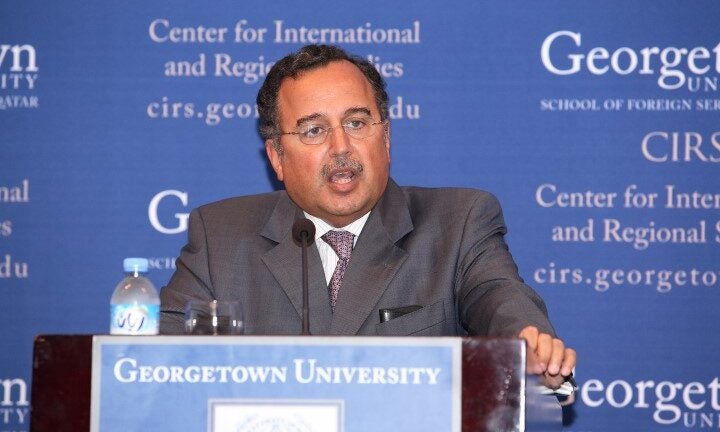American Studies, Dialogue Series, Regional Studies
Nabil Fahmy on US Arab Relations in a Changing World

Former Egyptian Ambassador to the United States Nabil Fahmy gave his analysis and insight into the foreign policy challenges facing the United States and the Arab world in a speech at the Diplomatic Club in Doha on April 29, 2009.
Fahmy stressed the inter-connectedness of the challenges facing the region and suggested that developments on both the American and Arab political landscapes have presented new opportunities to tackle them.
He hailed the election of Barack Obama in particular as an indicator that the “United States is going through a transformational period” in terms of the way it sees its place in the world. Under the Clinton administration, he said, the United States struggled with the new roles and responsibilities it assumed as it transitioned from a Cold War superpower to a global power. Meanwhile, George W. Bush “sold his foreign policy to Americans as a function of fears” and withdrew American participation in international treaties and cooperation with the United Nations.
In contrast, President Obama has told Americans that they need to change and has elevated the role of diplomacy in America’s toolkit for international engagement. Obama “was not selling fear,” Fahmy said, and instead arguing that America can “engage in the world.”
While the Arab world has a large stake in America’s actions – the global financial crisis, for example, Fahmy said, has led to a $10 billion reduction in foreign investment in the region – it is also experiencing a transformation of its own, spurred by a new openness in the media and an ever-more knowledgeable and globally exposed youth demographic. Fahmy sees, in the future, a continued importance for states that have traditionally played a leading role in the region, such as Egypt, as well as an increased importance for countries in the Gulf which have an opportunity to diversify their investments and gain a sense of economic power that is not wholly dependent on outside brokers.
However, Fahmy said, the Arab world suffers from a lack of unity created by conflicts in national priorities and petty rivalries. Thus, he advised, Arabs need to look to the model of the European Union and “find a way to talk in one voice even if we do not have identical positions.” In addition, the Arab foreign policy agenda should be more proactive and clearly stated, rather than merely reacting to agendas set out by other international players.
On a whole host of issues, from Iraq and Iran to Arab-Israeli peace and terrorism, the United States and the Arab world have a different ordering of priorities, according to Fahmy. The encouraging news, however, is that developments on one front often have positive repercussions for others, and President Obama “wants to deal with all these issues together.”
On Israeli-Palestinian peace, Ambassador Fahmy stressed that there is no solution but a two-state solution. He added that he was worried by the formation of a new Israeli government led by Binyamin Netanyahu and the Israeli right. If, however, Arab states make it clear that they will pursue their foreign policy objectives regardless of outside pressure, the United States will respond and offer cooperation on realizing peace, which is also in its national interest, as it did during the 1970s with Anwar Sadat.
Fahmy acknowledged that terrorism is a major challenge facing the Arab world, but he called for some historical perspective on the matter, arguing that Egypt was the target of terrorism and religious extremism before America. He also stated that terrorism is hardly a phenomenon limited to the Middle East. Europe experienced waves of terrorism in the 1960s and 1970s, and the West “cannot put blame on others, because they have been there before.”
On Iraq, Fahmy said it was in the interest of the Arab world that Iraq remain a unified country, and efforts must be made to promote national identity above the myriad sectarian identities that have emerged.
Responding to a question from the audience regarding political reform and the absence of democracy in the region, Fahmy said, “Having better institutions in the Arab world serves the Arab world before it serves America.” He stressed, however, that reform is a longer-term project that requires fostering implementation, rather than appealing to immediate and careless strategies.
A seasoned diplomat, Ambassador Fahmy was Egypt’s chief representative to the United States for nine years beginning in 1999. He has participated in Arab-Israeli peace talks and filled several advisory positions in the course of his tenure at the Foreign Ministry. Ambassador Fahmy is an expert on international security and disarmament and served as chairman of the UN Secretary General’s Advisory Board of Disarmament Matters in 2001.
Summary by Alex Schank.